Business Law: A Detailed Analysis of Contract Law and Agreements
VerifiedAdded on 2023/01/20
|5
|1347
|31
Homework Assignment
AI Summary
This business law assignment provides a detailed analysis of a case involving a dispute over a wheat sale. The core issue revolves around whether a valid contract was formed between Robert, the seller, and Cameron, the buyer. The analysis explores the principles of offer and acceptance, highlighting the importance of unconditional acceptance and the postal acceptance rule. The assignment examines the concepts of counteroffers, revocation of offers, and requests for information, and their implications on contract formation. The application section applies these legal principles to the case facts, concluding that a contract was indeed formed when Cameron posted his acceptance letter. Consequently, Cameron is legally bound to purchase the wheat, despite the subsequent drop in wheat prices. The analysis draws upon relevant legal precedents, including Adams v Lindsell and Brinkibon v Stahag Stahl, to support its conclusions.
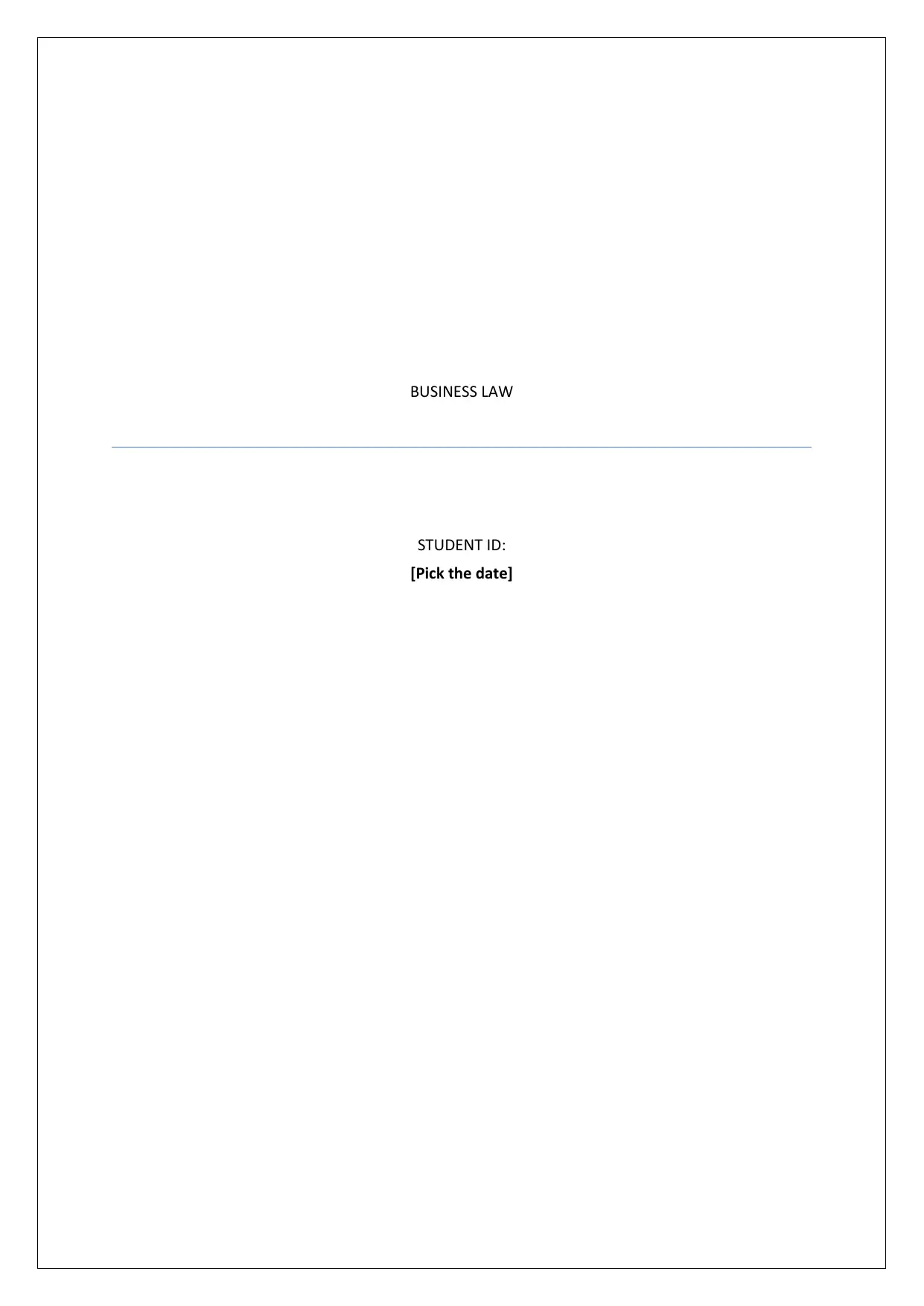
BUSINESS LAW
STUDENT ID:
[Pick the date]
STUDENT ID:
[Pick the date]
Paraphrase This Document
Need a fresh take? Get an instant paraphrase of this document with our AI Paraphraser
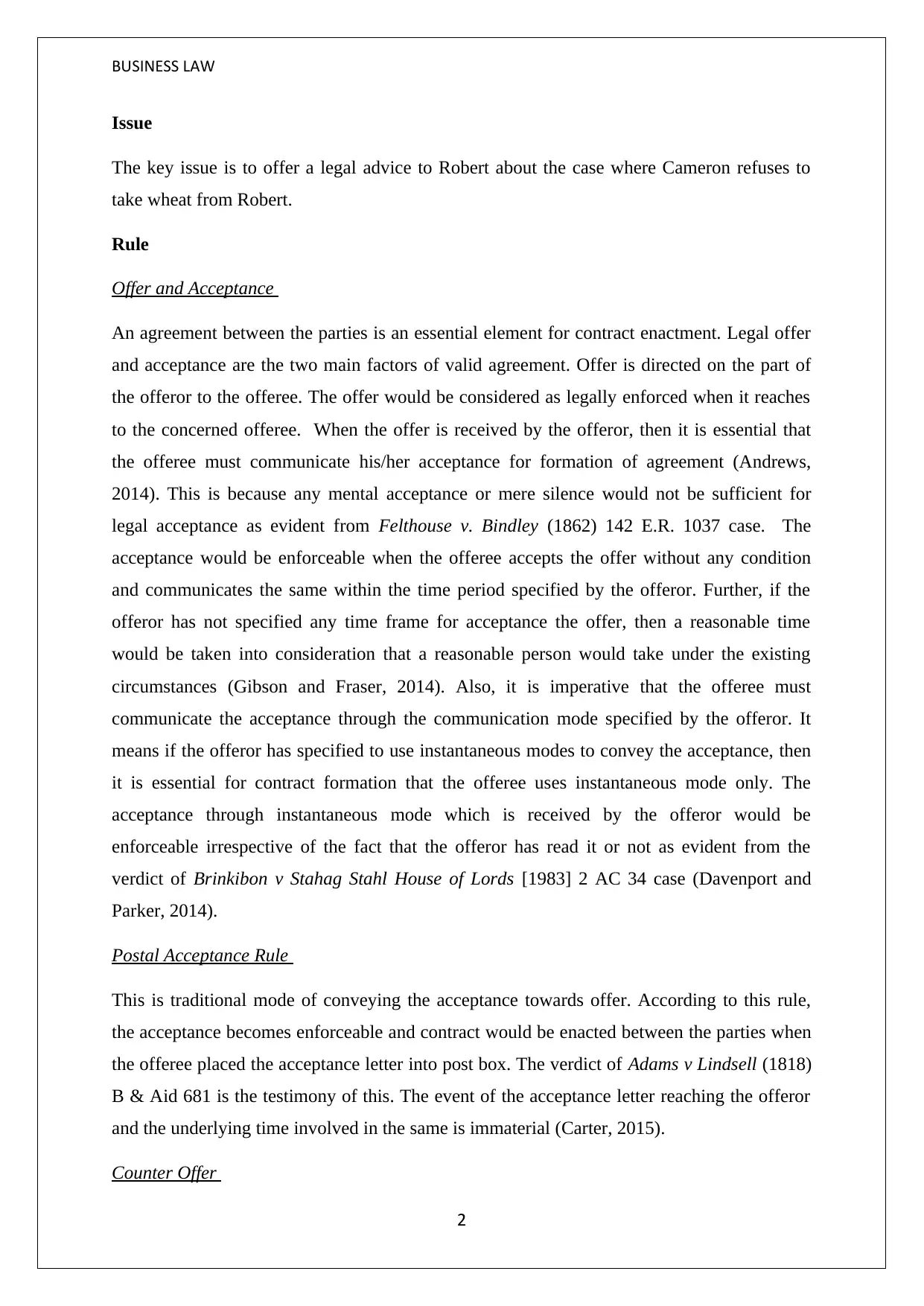
BUSINESS LAW
Issue
The key issue is to offer a legal advice to Robert about the case where Cameron refuses to
take wheat from Robert.
Rule
Offer and Acceptance
An agreement between the parties is an essential element for contract enactment. Legal offer
and acceptance are the two main factors of valid agreement. Offer is directed on the part of
the offeror to the offeree. The offer would be considered as legally enforced when it reaches
to the concerned offeree. When the offer is received by the offeror, then it is essential that
the offeree must communicate his/her acceptance for formation of agreement (Andrews,
2014). This is because any mental acceptance or mere silence would not be sufficient for
legal acceptance as evident from Felthouse v. Bindley (1862) 142 E.R. 1037 case. The
acceptance would be enforceable when the offeree accepts the offer without any condition
and communicates the same within the time period specified by the offeror. Further, if the
offeror has not specified any time frame for acceptance the offer, then a reasonable time
would be taken into consideration that a reasonable person would take under the existing
circumstances (Gibson and Fraser, 2014). Also, it is imperative that the offeree must
communicate the acceptance through the communication mode specified by the offeror. It
means if the offeror has specified to use instantaneous modes to convey the acceptance, then
it is essential for contract formation that the offeree uses instantaneous mode only. The
acceptance through instantaneous mode which is received by the offeror would be
enforceable irrespective of the fact that the offeror has read it or not as evident from the
verdict of Brinkibon v Stahag Stahl House of Lords [1983] 2 AC 34 case (Davenport and
Parker, 2014).
Postal Acceptance Rule
This is traditional mode of conveying the acceptance towards offer. According to this rule,
the acceptance becomes enforceable and contract would be enacted between the parties when
the offeree placed the acceptance letter into post box. The verdict of Adams v Lindsell (1818)
B & Aid 681 is the testimony of this. The event of the acceptance letter reaching the offeror
and the underlying time involved in the same is immaterial (Carter, 2015).
Counter Offer
2
Issue
The key issue is to offer a legal advice to Robert about the case where Cameron refuses to
take wheat from Robert.
Rule
Offer and Acceptance
An agreement between the parties is an essential element for contract enactment. Legal offer
and acceptance are the two main factors of valid agreement. Offer is directed on the part of
the offeror to the offeree. The offer would be considered as legally enforced when it reaches
to the concerned offeree. When the offer is received by the offeror, then it is essential that
the offeree must communicate his/her acceptance for formation of agreement (Andrews,
2014). This is because any mental acceptance or mere silence would not be sufficient for
legal acceptance as evident from Felthouse v. Bindley (1862) 142 E.R. 1037 case. The
acceptance would be enforceable when the offeree accepts the offer without any condition
and communicates the same within the time period specified by the offeror. Further, if the
offeror has not specified any time frame for acceptance the offer, then a reasonable time
would be taken into consideration that a reasonable person would take under the existing
circumstances (Gibson and Fraser, 2014). Also, it is imperative that the offeree must
communicate the acceptance through the communication mode specified by the offeror. It
means if the offeror has specified to use instantaneous modes to convey the acceptance, then
it is essential for contract formation that the offeree uses instantaneous mode only. The
acceptance through instantaneous mode which is received by the offeror would be
enforceable irrespective of the fact that the offeror has read it or not as evident from the
verdict of Brinkibon v Stahag Stahl House of Lords [1983] 2 AC 34 case (Davenport and
Parker, 2014).
Postal Acceptance Rule
This is traditional mode of conveying the acceptance towards offer. According to this rule,
the acceptance becomes enforceable and contract would be enacted between the parties when
the offeree placed the acceptance letter into post box. The verdict of Adams v Lindsell (1818)
B & Aid 681 is the testimony of this. The event of the acceptance letter reaching the offeror
and the underlying time involved in the same is immaterial (Carter, 2015).
Counter Offer
2
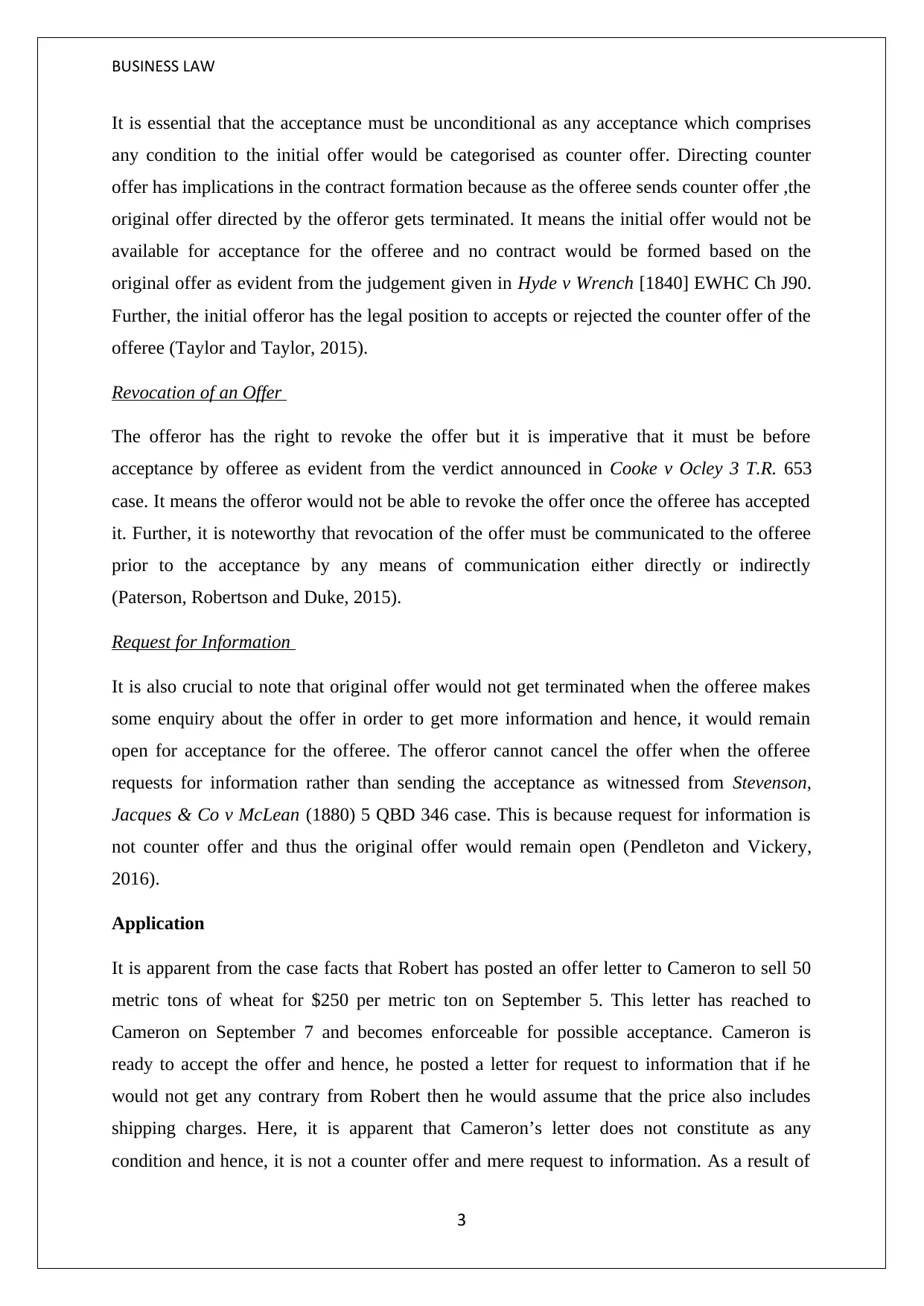
BUSINESS LAW
It is essential that the acceptance must be unconditional as any acceptance which comprises
any condition to the initial offer would be categorised as counter offer. Directing counter
offer has implications in the contract formation because as the offeree sends counter offer ,the
original offer directed by the offeror gets terminated. It means the initial offer would not be
available for acceptance for the offeree and no contract would be formed based on the
original offer as evident from the judgement given in Hyde v Wrench [1840] EWHC Ch J90.
Further, the initial offeror has the legal position to accepts or rejected the counter offer of the
offeree (Taylor and Taylor, 2015).
Revocation of an Offer
The offeror has the right to revoke the offer but it is imperative that it must be before
acceptance by offeree as evident from the verdict announced in Cooke v Ocley 3 T.R. 653
case. It means the offeror would not be able to revoke the offer once the offeree has accepted
it. Further, it is noteworthy that revocation of the offer must be communicated to the offeree
prior to the acceptance by any means of communication either directly or indirectly
(Paterson, Robertson and Duke, 2015).
Request for Information
It is also crucial to note that original offer would not get terminated when the offeree makes
some enquiry about the offer in order to get more information and hence, it would remain
open for acceptance for the offeree. The offeror cannot cancel the offer when the offeree
requests for information rather than sending the acceptance as witnessed from Stevenson,
Jacques & Co v McLean (1880) 5 QBD 346 case. This is because request for information is
not counter offer and thus the original offer would remain open (Pendleton and Vickery,
2016).
Application
It is apparent from the case facts that Robert has posted an offer letter to Cameron to sell 50
metric tons of wheat for $250 per metric ton on September 5. This letter has reached to
Cameron on September 7 and becomes enforceable for possible acceptance. Cameron is
ready to accept the offer and hence, he posted a letter for request to information that if he
would not get any contrary from Robert then he would assume that the price also includes
shipping charges. Here, it is apparent that Cameron’s letter does not constitute as any
condition and hence, it is not a counter offer and mere request to information. As a result of
3
It is essential that the acceptance must be unconditional as any acceptance which comprises
any condition to the initial offer would be categorised as counter offer. Directing counter
offer has implications in the contract formation because as the offeree sends counter offer ,the
original offer directed by the offeror gets terminated. It means the initial offer would not be
available for acceptance for the offeree and no contract would be formed based on the
original offer as evident from the judgement given in Hyde v Wrench [1840] EWHC Ch J90.
Further, the initial offeror has the legal position to accepts or rejected the counter offer of the
offeree (Taylor and Taylor, 2015).
Revocation of an Offer
The offeror has the right to revoke the offer but it is imperative that it must be before
acceptance by offeree as evident from the verdict announced in Cooke v Ocley 3 T.R. 653
case. It means the offeror would not be able to revoke the offer once the offeree has accepted
it. Further, it is noteworthy that revocation of the offer must be communicated to the offeree
prior to the acceptance by any means of communication either directly or indirectly
(Paterson, Robertson and Duke, 2015).
Request for Information
It is also crucial to note that original offer would not get terminated when the offeree makes
some enquiry about the offer in order to get more information and hence, it would remain
open for acceptance for the offeree. The offeror cannot cancel the offer when the offeree
requests for information rather than sending the acceptance as witnessed from Stevenson,
Jacques & Co v McLean (1880) 5 QBD 346 case. This is because request for information is
not counter offer and thus the original offer would remain open (Pendleton and Vickery,
2016).
Application
It is apparent from the case facts that Robert has posted an offer letter to Cameron to sell 50
metric tons of wheat for $250 per metric ton on September 5. This letter has reached to
Cameron on September 7 and becomes enforceable for possible acceptance. Cameron is
ready to accept the offer and hence, he posted a letter for request to information that if he
would not get any contrary from Robert then he would assume that the price also includes
shipping charges. Here, it is apparent that Cameron’s letter does not constitute as any
condition and hence, it is not a counter offer and mere request to information. As a result of
3
⊘ This is a preview!⊘
Do you want full access?
Subscribe today to unlock all pages.

Trusted by 1+ million students worldwide
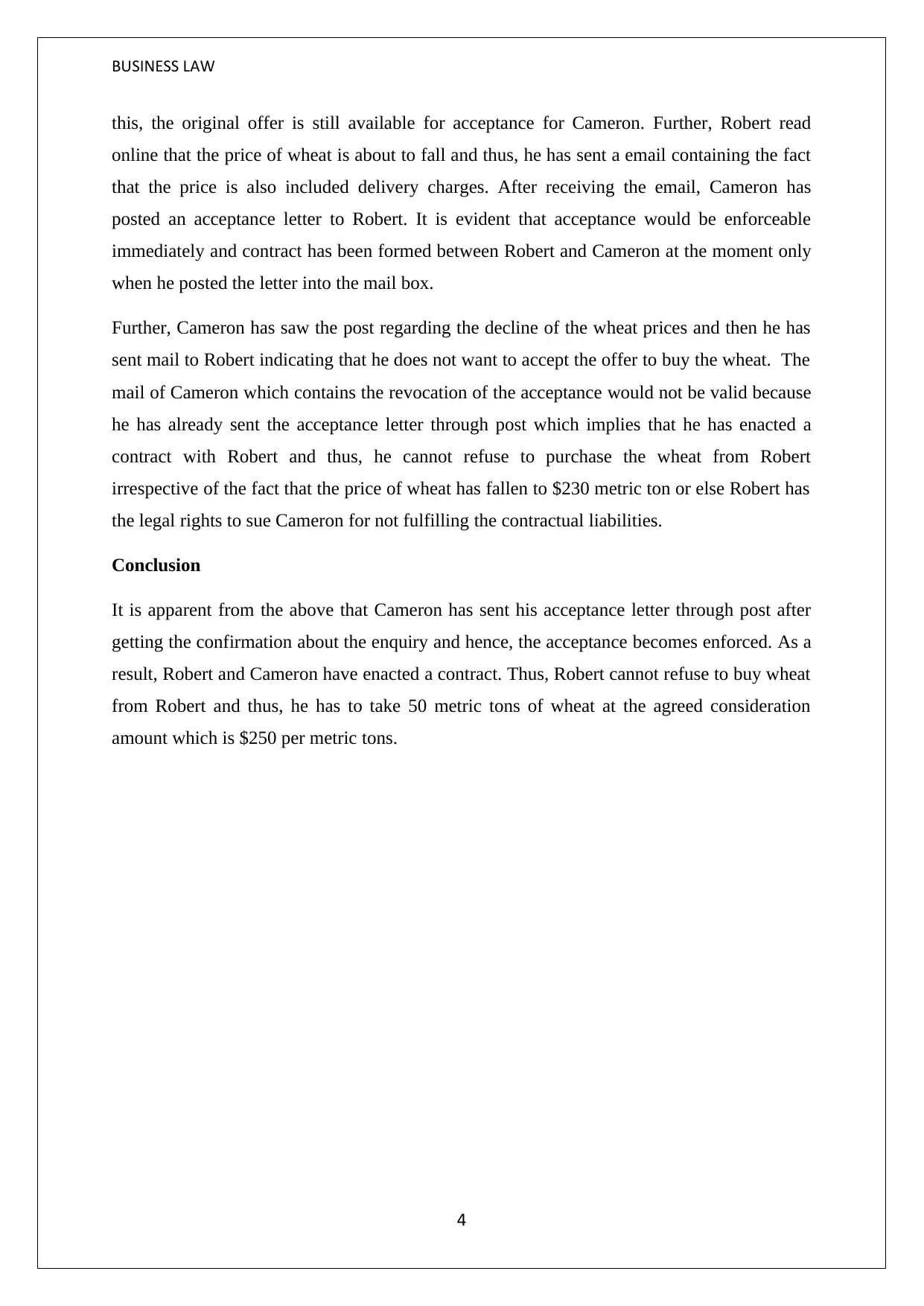
BUSINESS LAW
this, the original offer is still available for acceptance for Cameron. Further, Robert read
online that the price of wheat is about to fall and thus, he has sent a email containing the fact
that the price is also included delivery charges. After receiving the email, Cameron has
posted an acceptance letter to Robert. It is evident that acceptance would be enforceable
immediately and contract has been formed between Robert and Cameron at the moment only
when he posted the letter into the mail box.
Further, Cameron has saw the post regarding the decline of the wheat prices and then he has
sent mail to Robert indicating that he does not want to accept the offer to buy the wheat. The
mail of Cameron which contains the revocation of the acceptance would not be valid because
he has already sent the acceptance letter through post which implies that he has enacted a
contract with Robert and thus, he cannot refuse to purchase the wheat from Robert
irrespective of the fact that the price of wheat has fallen to $230 metric ton or else Robert has
the legal rights to sue Cameron for not fulfilling the contractual liabilities.
Conclusion
It is apparent from the above that Cameron has sent his acceptance letter through post after
getting the confirmation about the enquiry and hence, the acceptance becomes enforced. As a
result, Robert and Cameron have enacted a contract. Thus, Robert cannot refuse to buy wheat
from Robert and thus, he has to take 50 metric tons of wheat at the agreed consideration
amount which is $250 per metric tons.
4
this, the original offer is still available for acceptance for Cameron. Further, Robert read
online that the price of wheat is about to fall and thus, he has sent a email containing the fact
that the price is also included delivery charges. After receiving the email, Cameron has
posted an acceptance letter to Robert. It is evident that acceptance would be enforceable
immediately and contract has been formed between Robert and Cameron at the moment only
when he posted the letter into the mail box.
Further, Cameron has saw the post regarding the decline of the wheat prices and then he has
sent mail to Robert indicating that he does not want to accept the offer to buy the wheat. The
mail of Cameron which contains the revocation of the acceptance would not be valid because
he has already sent the acceptance letter through post which implies that he has enacted a
contract with Robert and thus, he cannot refuse to purchase the wheat from Robert
irrespective of the fact that the price of wheat has fallen to $230 metric ton or else Robert has
the legal rights to sue Cameron for not fulfilling the contractual liabilities.
Conclusion
It is apparent from the above that Cameron has sent his acceptance letter through post after
getting the confirmation about the enquiry and hence, the acceptance becomes enforced. As a
result, Robert and Cameron have enacted a contract. Thus, Robert cannot refuse to buy wheat
from Robert and thus, he has to take 50 metric tons of wheat at the agreed consideration
amount which is $250 per metric tons.
4
Paraphrase This Document
Need a fresh take? Get an instant paraphrase of this document with our AI Paraphraser
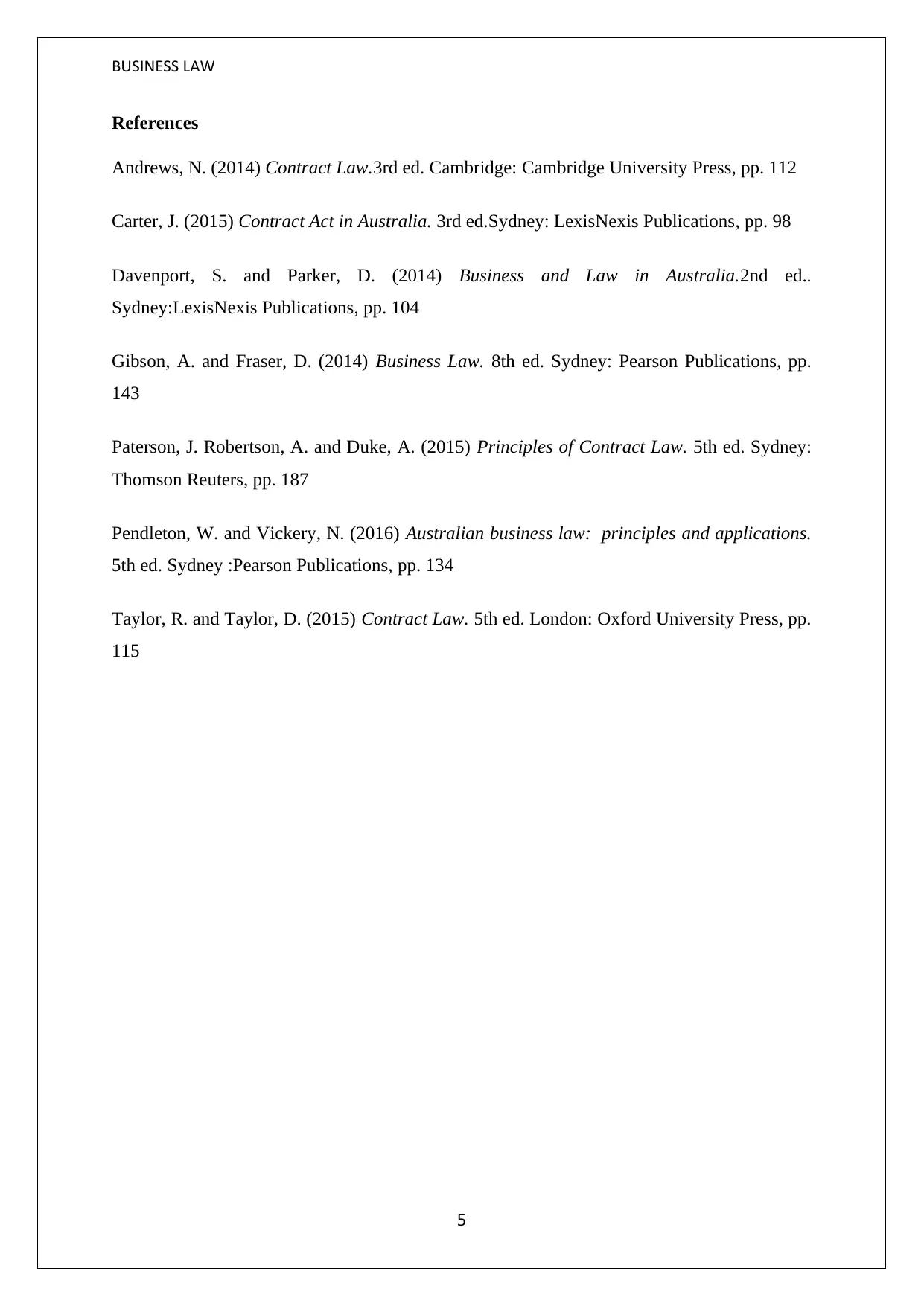
BUSINESS LAW
References
Andrews, N. (2014) Contract Law.3rd ed. Cambridge: Cambridge University Press, pp. 112
Carter, J. (2015) Contract Act in Australia. 3rd ed.Sydney: LexisNexis Publications, pp. 98
Davenport, S. and Parker, D. (2014) Business and Law in Australia.2nd ed..
Sydney:LexisNexis Publications, pp. 104
Gibson, A. and Fraser, D. (2014) Business Law. 8th ed. Sydney: Pearson Publications, pp.
143
Paterson, J. Robertson, A. and Duke, A. (2015) Principles of Contract Law. 5th ed. Sydney:
Thomson Reuters, pp. 187
Pendleton, W. and Vickery, N. (2016) Australian business law: principles and applications.
5th ed. Sydney :Pearson Publications, pp. 134
Taylor, R. and Taylor, D. (2015) Contract Law. 5th ed. London: Oxford University Press, pp.
115
5
References
Andrews, N. (2014) Contract Law.3rd ed. Cambridge: Cambridge University Press, pp. 112
Carter, J. (2015) Contract Act in Australia. 3rd ed.Sydney: LexisNexis Publications, pp. 98
Davenport, S. and Parker, D. (2014) Business and Law in Australia.2nd ed..
Sydney:LexisNexis Publications, pp. 104
Gibson, A. and Fraser, D. (2014) Business Law. 8th ed. Sydney: Pearson Publications, pp.
143
Paterson, J. Robertson, A. and Duke, A. (2015) Principles of Contract Law. 5th ed. Sydney:
Thomson Reuters, pp. 187
Pendleton, W. and Vickery, N. (2016) Australian business law: principles and applications.
5th ed. Sydney :Pearson Publications, pp. 134
Taylor, R. and Taylor, D. (2015) Contract Law. 5th ed. London: Oxford University Press, pp.
115
5
1 out of 5
Related Documents
Your All-in-One AI-Powered Toolkit for Academic Success.
+13062052269
info@desklib.com
Available 24*7 on WhatsApp / Email
![[object Object]](/_next/static/media/star-bottom.7253800d.svg)
Unlock your academic potential
Copyright © 2020–2026 A2Z Services. All Rights Reserved. Developed and managed by ZUCOL.





